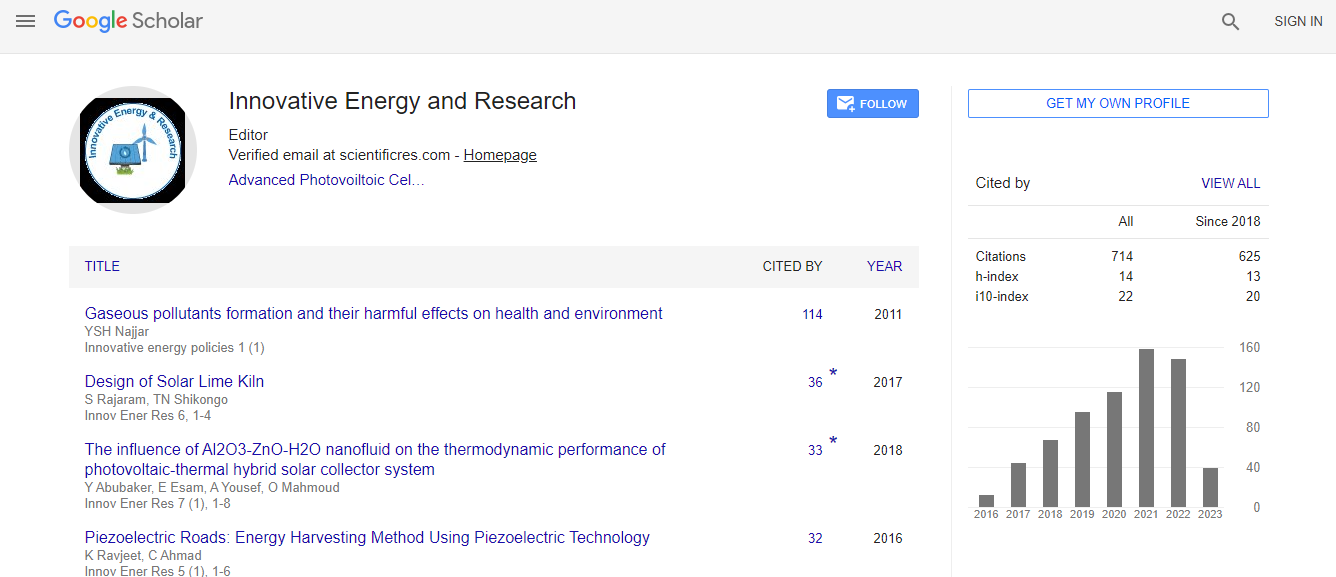Our Group organises 3000+ Global Conferenceseries Events every year across USA, Europe & Asia with support from 1000 more scientific Societies and Publishes 700+ Open Access Journals which contains over 50000 eminent personalities, reputed scientists as editorial board members.
Open Access Journals gaining more Readers and Citations
700 Journals and 15,000,000 Readers Each Journal is getting 25,000+ Readers
Google Scholar citation report
Citations : 712
Innovative Energy & Research received 712 citations as per Google Scholar report
Innovative Energy & Research peer review process verified at publons
Indexed In
- Google Scholar
- Open J Gate
- Genamics JournalSeek
- RefSeek
- Hamdard University
- EBSCO A-Z
- Publons
- Euro Pub
- ICMJE
Useful Links
Recommended Journals
Related Subjects
Share This Page
Enhancement of biocatalytic conversion of carbon dioxide using methyl-functionalized silica nanoparticles
Joint Event on 2nd International Conference on Renewable Energy and Resources & Energy Materials and Fuel Cell Research
Byung-Keun Oh
Sogang University, South Korea
Posters & Accepted Abstracts: Innov Ener Res
Abstract
As chemical methods to reduce carbon dioxide (CO2), catalysis, electrocatalysis, and photocatalysis methods have been studied to obtain valuable products such as methanol, formic acid, and formaldehyde from CO2. However, chemical catalytic reaction methods require high-temperature and high-pressure operating conditions and electric/photodynamic energy, with the drawbacks of a low selectivity and overall conversion yield. Biological CO2 transformation technologies have been highlighted as an alternative, because they have shown a high selectivity and conversion yield under ambient operation conditions. However, in a biological reaction process using a gas substrate, the overall reaction rate is limited by the low gas solubility and slow gas–liquid mass transfer rate. In this study, methyl-functionalized magnetic silica nanoparticles (methyl- MSNs) were synthesized and applied to a CO2–water system to evaluate gas–liquid mass transfer. The addition of methyl- MSNs increased the solubilized CO2 concentration by 31.1% and the volumetric mass transfer coefficient was 78.3% higher than that in a control experiment without nanoparticles. The addition of methyl-MSNs in the formate dehydrogenase reaction resulted in a 12.0% increase in formic acid production and could decrease the reaction time required to finish the batch enzyme reaction from 1.5 h to 1.0 h. This result showed that the addition of methyl-MSNs could be useful for biological processes, including enzyme reactions, when using a gas substrate to improve productivity. Acknowledgement: This research was supported by C1 Gas Refinery Program through the National Research Foundation of Korea(NRF) funded by the Ministry of Science, ICT & Future Planning (2017M3D3A1A01037006-2).Biography
Byung-Keun Oh received his Ph.D. degree in Chemical and Biomolecular Engineering at Sogang University for his work on protein chip for detection of pathogens existing in contaminated environment in 2003. He worked then as a postdoctoral fellow in Northwestern University from 2004 to 2006. In 2006, he joined the faculty as a professor in Department of Chemical and Biomolecular Engineering at Sogang University. His research interests mainly lie in the interdisciplinary area which can be termed as "biotechnology and bioenergy", especially the development of nanoparticle-based biodetection schemes and the enhancement of biological conversion efficiency in gas based fermentation.
E-mail: bkohkr@gmail.com

 Spanish
Spanish  Chinese
Chinese  Russian
Russian  German
German  French
French  Japanese
Japanese  Portuguese
Portuguese  Hindi
Hindi 
